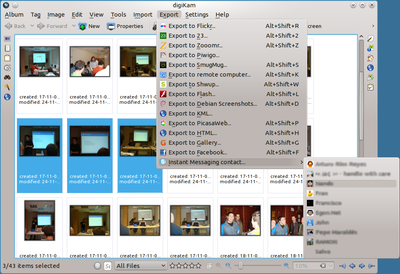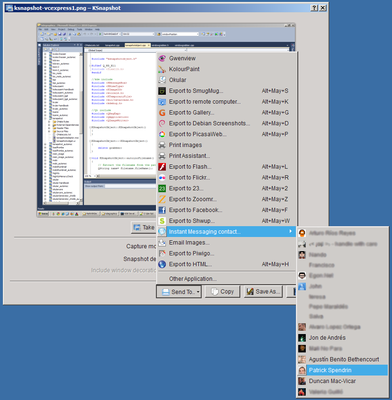Today I received an e-mail from Vincent about some strange warnings dpkg-shlibdeps was showing when building from source the Wt packages on Debian:
dpkg-shlibdeps: warning: symbol pthread_join used by debian/witty/usr/lib/libwthttp.so.2.2.4 found in none of the libraries.
dpkg-shlibdeps: warning: symbol pthread_key_delete used by debian/witty/usr/lib/libwthttp.so.2.2.4 found in none of the libraries.
dpkg-shlibdeps: warning: symbol pthread_mutexattr_init used by debian/witty/usr/lib/libwthttp.so.2.2.4 found in none of the libraries.
dpkg-shlibdeps: warning: symbol pthread_setspecific used by debian/witty/usr/lib/libwthttp.so.2.2.4 found in none of the libraries.
dpkg-shlibdeps: warning: symbol pthread_mutexattr_settype used by debian/witty/usr/lib/libwthttp.so.2.2.4 found in none of the libraries.
dpkg-shlibdeps: warning: symbol pthread_detach used by debian/witty/usr/lib/libwthttp.so.2.2.4 found in none of the libraries.
dpkg-shlibdeps: warning: symbol pthread_mutexattr_destroy used by debian/witty/usr/lib/libwthttp.so.2.2.4 found in none of the libraries.
dpkg-shlibdeps: warning: symbol pthread_getspecific used by debian/witty/usr/lib/libwthttp.so.2.2.4 found in none of the libraries.
dpkg-shlibdeps: warning: symbol pthread_key_create used by debian/witty/usr/lib/libwthttp.so.2.2.4 found in none of the libraries.
dpkg-shlibdeps: warning: symbol pthread_sigmask used by debian/witty/usr/lib/libwthttp.so.2.2.4 found in none of the libraries.
dpkg-shlibdeps: warning: symbol pthread_mutexattr_settype used by debian/witty/usr/lib/libwt.so.2.2.4 found in none of the libraries.
dpkg-shlibdeps: warning: symbol pthread_mutexattr_init used by debian/witty/usr/lib/libwt.so.2.2.4 found in none of the libraries.
dpkg-shlibdeps: warning: symbol pthread_mutexattr_destroy used by debian/witty/usr/lib/libwt.so.2.2.4 found in none of the libraries.
He asked if I knew what was that (a dpkg-shlibdeps bug?) and what did it mean, it case it was correct.
That error means pthread_join, pthread_mutexattr_destroy, etc are used by libwt.so and libwthttp.so but those libraries are not linked to libpthread.so by Wt’s buildsystem. I. e. the linker command line when putting libwt.so and libwthttp.so together does not have a “-lpthread“.
Is dpkg-shlibdeps right about that? Yes, it is:
- libwt.so uses libpthread.so in the XML library (Wt bundles the sources ot MiniXML and compiles them as part of libwt.so)
- libwthttp.so uses libpthread.so in WServer.C
So, if the buildsystem is not linking libwt.so and libwthttp.so to libpthread.so, why doesn’t linking fail with “unresolved reference” errors? It’s because of the link interface in Boost is wrong.
Link interface? What’s that?
If you are reading me via Planet KDE, you probably know what I’m talking about because Alex has written about this. If you don’t know what I’m talking about, keep reading.
Say you have libA.so, libB.so and libC.so.
- libA.so does not link to any external library, save for glibc
- libB.so links only to libA.so and glibc
- libC.so links only libB.so and glibc
When you run ldd libC.so, what will you get? This?
$ ldd libC.so
linux-gate.so.1 => (0xb7f66000)
libB.so => /usr/lib/libB.so
libc.so.6 => /lib/tls/i686/cmov/libc.so.6
/lib/ld-linux.so.2 (0xb7f67000)
or this?
$ ldd libC.so
linux-gate.so.1 => (0xb7f66000)
libB.so => /usr/lib/libB.so
libA.so => /usr/lib/libA.so < =======
libc.so.6 => /lib/tls/i686/cmov/libc.so.6
/lib/ld-linux.so.2 (0xb7f67000)
The answer is you’ll see the second output: libC.so is linking to libA.so, although when you linked it you only did gcc -o libC.so libC.c -lB (no -lA, so no explicit linking to libA.so):
libC -> libB -> libA
Why is that? Why is libA.so being dragged to libC.so? It’s because of what we call “link interface”
As libC.so links to libB.so, by default, libC.so‘s ELF header will have every library libB.so links to as NEEDED: libB.so‘s dependencies have been transitively passed into libC.so! Usually that’s not what you want, therefore it is possible to specify a “reduced link interface”: given that libA.so is only used internally in libB.so (users of libB.so do not need to use any type or function defined in libA), there is no need to link libC.so to libA.so.
Therefore:
- As libwt.so and libwthttp.so link to libboost_thread-mt.so from Boost
- In Debian, Boost is compiled with threads (i. e. it links to libpthread.so)
- Boost does not publish a reduced link interface but the full link interface (i. e. every dependency of Boost is transitively passed into applications/libraries using Boost)
… even though libwt.so and libwthttp.so were not linking to libpthread.so explicitly, they were picking libpthread.so from libboost_thread-mt.so and no linkage error happened. If libboost_thread-mt.so would not export libpthread.so (it should not!), linkage of libwt.so and libwthttp.so would have failed and the authors of Wt would have noticed the bug in their build system.
While this is not a critical issue, it makes your application/library load slower, because it needs to resolve and load the NEEDED libraries.
Please note this discussion is valid for any operating system, including Windows and Mac OS X.
If you use CMake as your build system and you want to adopt a reduced link interface, take a look at the CMake docs for TARGET_LINK_LIBRARIES, particularly the LINK_INTERFACE_LIBRARIES section:
Library dependencies are transitive by default. When this target is linked into another target then the libraries linked to this target will appear on the link line for the other target too. See the LINK_INTERFACE_LIBRARIES target property to override the set of transitive link dependencies for a target.
target_link_libraries( LINK_INTERFACE_LIBRARIES
[[debug|optimized|general] ] …)
The LINK_INTERFACE_LIBRARIES mode appends the libraries to the LINK_INTERFACE_LIBRARIES and its per-configuration equivalent target properties instead of using them for linking. Libraries specified as “debug” are appended to the the LINK_INTERFACE_LIBRARIES_DEBUG property (or to the properties corresponding to configurations listed in the DEBUG_CONFIGURATIONS global property if it is set). Libraries specified as “optimized” are appended to the the LINK_INTERFACE_LIBRARIES property. Libraries specified as “general” (or without any keyword) are treated as if specified for both “debug” and “optimized”.
NB: The comments in this blog do not work due to a hosting issue


